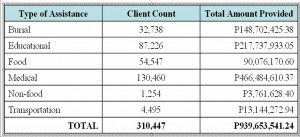Less than a week before Pres. Rodrigo Duterte delivers his first State of the Nation Address (SONA), Department of Social Welfare and Development (DSWD) Central Office, Sec. Judy M. Taguiwalo highlighted the urgent need of Filipinos for adequate and affordable healthcare as indicated by the fact that medical assistance is the number one request of those seeking support from the DSWD.
“As the lead government agency in social protection, the DSWD aims to give assistance to indigent and vulnerable Filipinos to help them cope during crisis situations, including situations when they need assistance for hospital and medical needs. The department, however, can only do so much to help Filipinos in this area through its programs. We are now looking into possibilities to coordinate with other concerned government agencies on how we can improve the provision of healthcare to the poor,” she said. “We are also planning ways to make the process of accessing services easier for DSWD clients: we want to make the processing of documents easier and faster by cutting red tape as directed by Pres. Duterte himself. We have also begun to implement information drives on the same,” she said.
Through its Protective Services Program, the DSWD offers various types of assistance to those in need; among the services is the Assistance to Individuals in Crisis Situations (AICS). Under the AICS and the Crisis Intervention Unit (CIU) the DSWD provides medical, educational, burial and transportation assistance to persons/families in crisis situations, particularly to those who belong to the informal sector and other poor, marginalized, vulnerable, and disadvantaged sectors.
From January to June 2016, the CIU office of the DSWD Central Office was able to provide assistance to a total of 17, 316 citizens who sought financial help for their respective emergency concerns. Of this number, 9,054 asked for medical assistance, and the Central Office released a total of P27,214,803.01 from January to June for them.
The types of assistance provided by the DSWD Central Office are as follows:
The types of assistance provided by the DSWD nationwide
“Food” refers to food packs provided to clients.
“Non-food” refers to the cash amount in food subsidy given to clients from the provinces who serve as the watchers and aides of patients in the hospital. This type of assistance is also given to clients who are victims of calamities, as well as those affected by fires.
Number of clients assisted
Among all the DSWD units, the NCR office handled the most number of clients (96,730) and its assistance provided amounted to a total of P225, 179,257,06. Next was FO 4A which assisted 29,913 clients and providing a total of 93,036,435.98 in assistance. FO 7 also handled a significant number of clients at 23,632 and provided assistance amounted to 93,342,541.17.
Medical Assistance
The top 5 DSWD units that handled the most number of clients seeking medical assistance are the following:
The NCR with a total of 29,678 clients (P71,945,016.40); FO 4A with 12, 844 clients (P40,025,270.48); FO 6 with 12,468 clients (P56,217,572.05); FO 11 with 10, 989 clients (43,075,902); and FO 2 with 9,435 clients (27,966,521.11).
Education Assistance
The top 5 DSWD units that handled the most number of clients seeking educational assistance are the following:
The NCR with a total of 18,157 clients (P47,857,436 in assistance); FO 2 with 16,150 clients (P27,867,250.00); FO 3 with 11,560 clients (P34,649,273.81); FO 4A with 11,397 clients (P33,945,100.00; and FO 6 with 7,234 clients (P20,234,411.72).
Persons Living with HIV
The DSWD also provided assistance to 88 Persons Living with HIV-AIDs (PLHIV) and the assistance amounted to a total of 327,615.72. Two PLHIV clients aged between 0-13 – one male, one female – were given assistance; 35 PLHIV clients aged between 18-29 (27 male, 8 female) were also assisted; as well as 40 others (aged 30-44; 33 male, 7 female). Ten PLHIV aged between 45 to 59 (5 male, 5 female) also received help. One male PHLIV aged between 60 to 70 years old was also assisted.
More women sought help than men
Across all categories of assistance, more women than men sought assistance. Of the 310,477 total number of clients, 215, 444 were women. The only category of assistance sought wherein there were more men clients was the subcategory of medical assistance to PHLIV.
More women sought medical assistance (92,896) than men (27,703); education assistance (59,523 against 27,703); transportation assistance (2,784 compared to 1,171).
“The DSWD can only provide emergency support for Filipinos during health crisis situations; based on the conduct of this aspect of its mandate, it’s clear that there is a need for more substantial, more sustainable means to ensure that Filipinos have access to healthcare,” she said. “There’s also grounds to say that that women carry the heavier burden when it comes to seeking assistance for their families, particularly for medical and educational needs,” she said. ###




